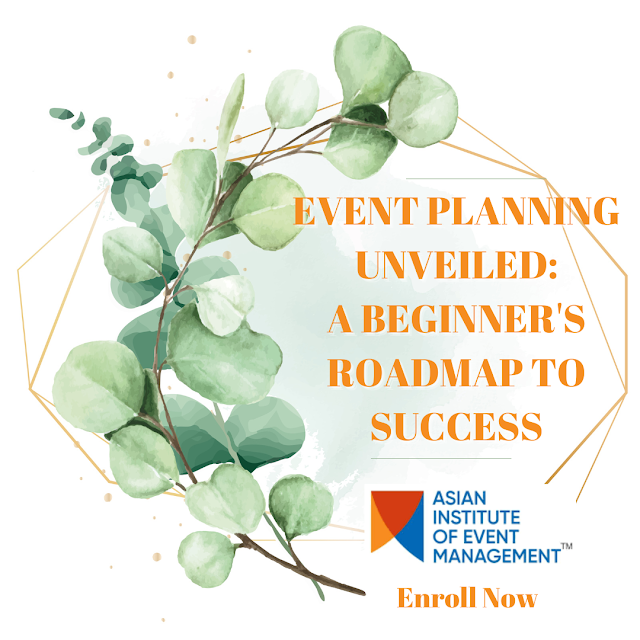Event Planning Unveiled: A Beginner's Roadmap to Success
From Concept to Celebration, Master the Art of Event Management with this Comprehensive Guide – Your Step-by-Step Handbook for Planning, Executing, and Analyzing Memorable Events.
Starting out in the ever-changing world of events management calls for a strong set of abilities and expertise. The best approach to get the skills and knowledge required to succeed in this dynamic field is to enrol in an events management course.
To hone your abilities in coordinating the magnificent details of weddings that guests will never forget, you may want to enrol in a wedding planner diploma course. You will be prepared to handle the specific difficulties and subtleties of wedding preparation with the information and skills you gain from this specialised programme.
Whether your goal is to become a flexible events manager or to focus on the magical realm of wedding planning, these classes will provide you the framework you need to succeed. These courses are created to equip you with the skills you need to succeed, whether it's learning about event logistics, budgeting, or the art of creating unforgettable wedding experiences.
Keep in mind that formal education through an events management course and a wedding planner diploma course can considerably enhance your skills as you go through this comprehensive guide. A diverse education will equip you to take on the challenges of event organising and thrive in this exciting and lucrative field.
Step 1: Define Your Event Objectives and Concept
- Make sure everyone knows what you're hoping to accomplish with your event. Is it a party, a meeting, a charity event, or the debut of a new product?
- Theme, intended readers, and important points should all be part of a well-developed concept.
- Summarise your event's purpose in a mission statement.
Step 2: Establish a Realistic Budget
- Think about everything that could cost money for your event, including the venue, food, décor, entertainment, and advertising.
- Spend money on things that are most important to you and your event's goals in order of importance.
- Remember to set aside money in case of unforeseen costs.
Step 3: Create a Timeline and Checklist
- From the beginning of the planning process through to the evaluation that follows the event, create a comprehensive schedule.
- To facilitate efficient planning, break down tasks into a checklist and assign due dates to each item.
- As the event date draws near, make sure to review and update the timeline often.
Step 4: Venue Selection and Booking
- Find a location that fits the theme of your event and can accommodate the expected number of attendees.
- Make sure the venue's extra services, as well as the day, time, and other pertinent facts are all part of the contract you negotiate and secure.
Step 5: Vendor Coordination
- Locate and hire providers of food, AV, and decorating services, as well as any other essentials.
- Get estimates, negotiate contracts, and check that all vendors can handle your event's specific needs.
Step 6: Marketing and Promotion
- Create an all-encompassing marketing plan to publicise your event and attract the desired attendees.
- Raise awareness and enthusiasm through various mediums, including social media, email marketing, and conventional advertising.
Step 7: Event Execution
- Make sure everything runs smoothly on the big day by coordinating with vendors, employees, and volunteers.
- Prepare for the event by writing down every step of the process, from setup to registration to presentations.
Step 8: Post-Event Analysis
- To gauge the event's efficacy, survey those who were there, including attendees, vendors, and employees.
- Compare actual spending with planned expenditures to find places for savings.
- Compile a report outlining the key takeaways for use in the future.
Conclusion:
Be well-organized and give your event plenty of thought if you want to prepare it well. Event management can be a tough field, but with this detailed guidance, even a novice can pull off a spectacular event. Always be ready to change your strategy based on what you learn, and keep an open mind so that you can improve your abilities with every challenge you face.
Join AIEM and explore the world of event management.


.png)

Comments
Post a Comment